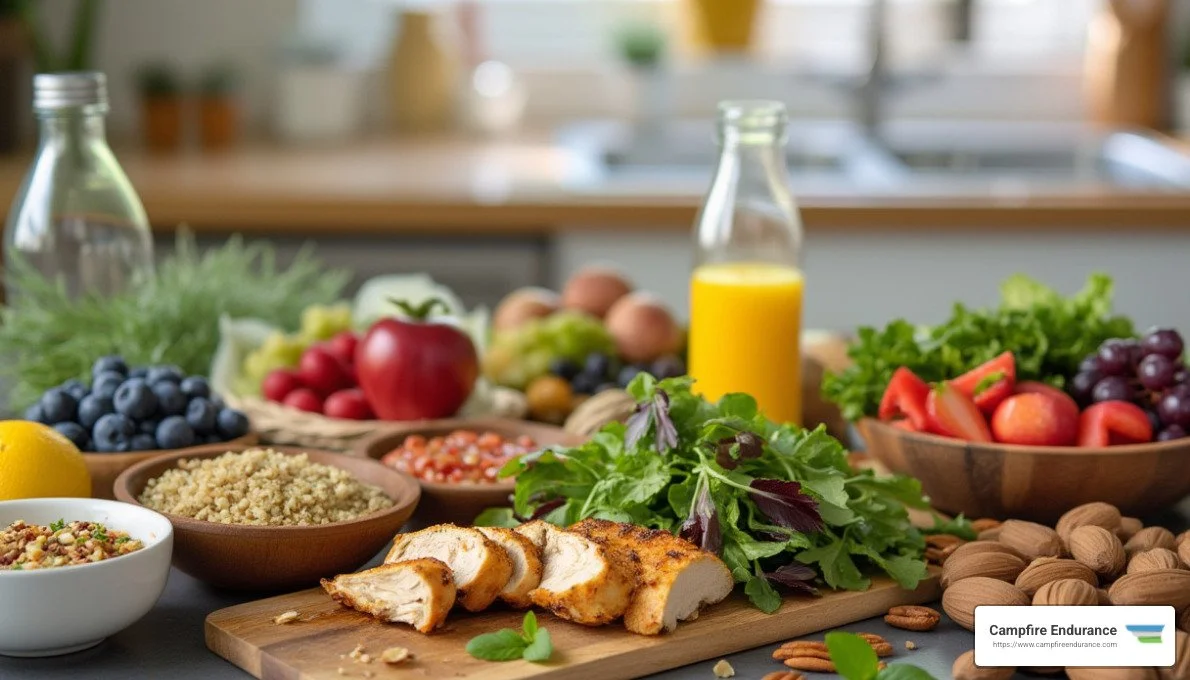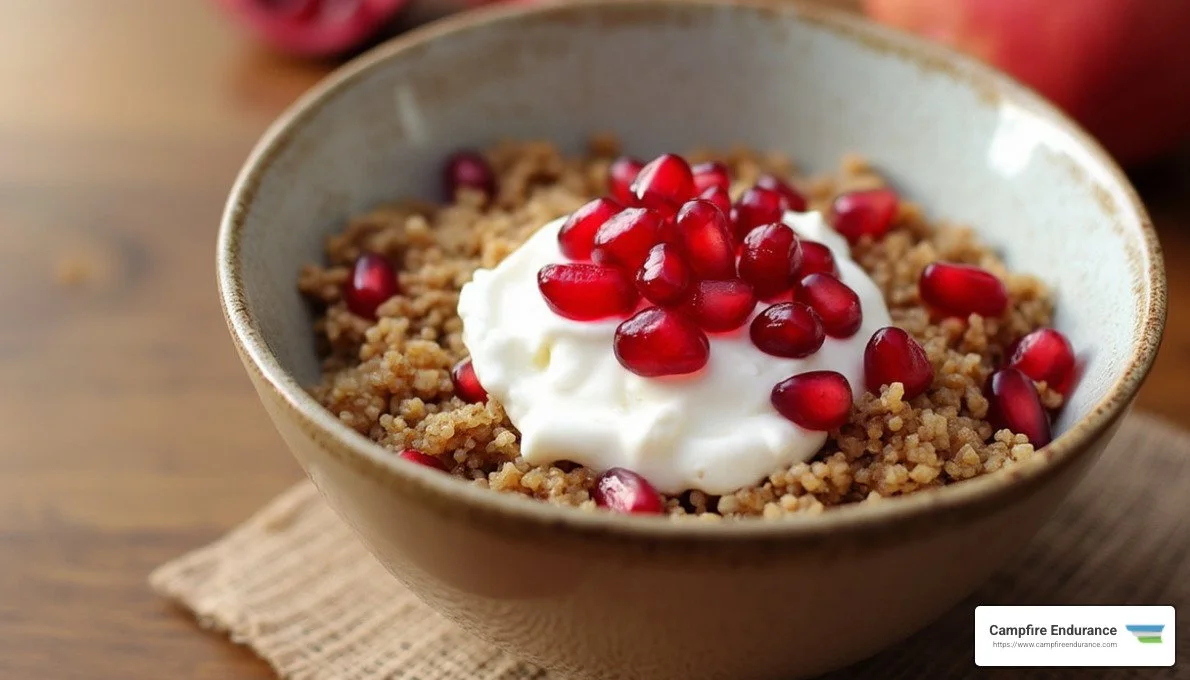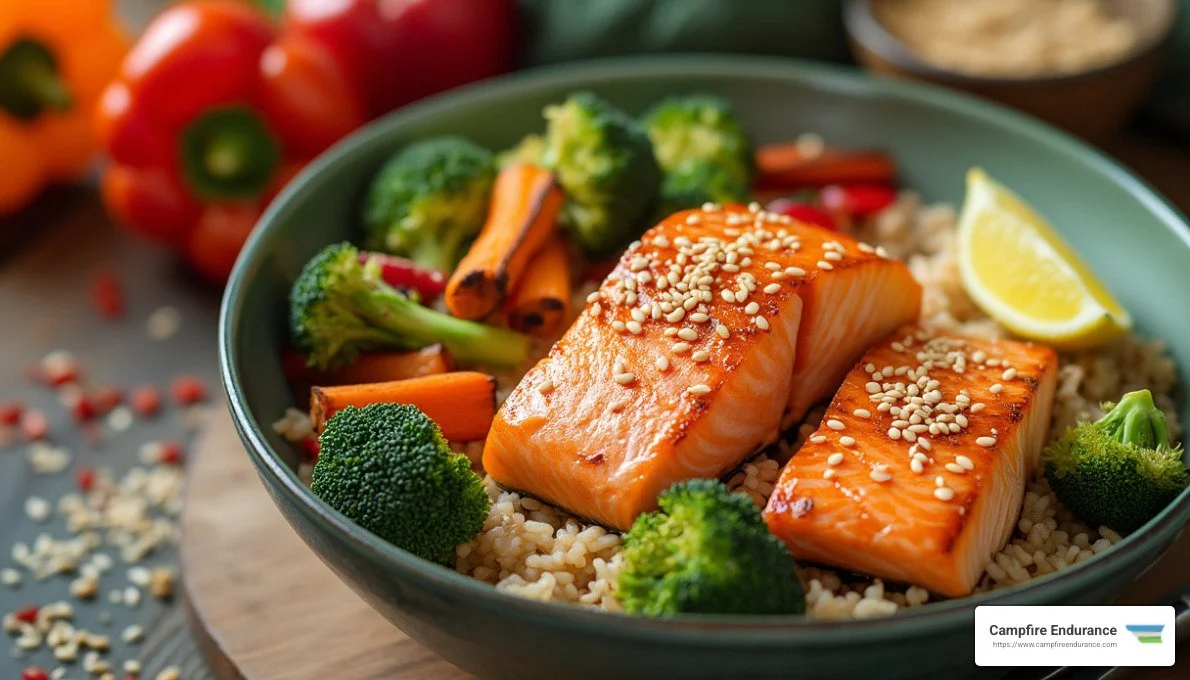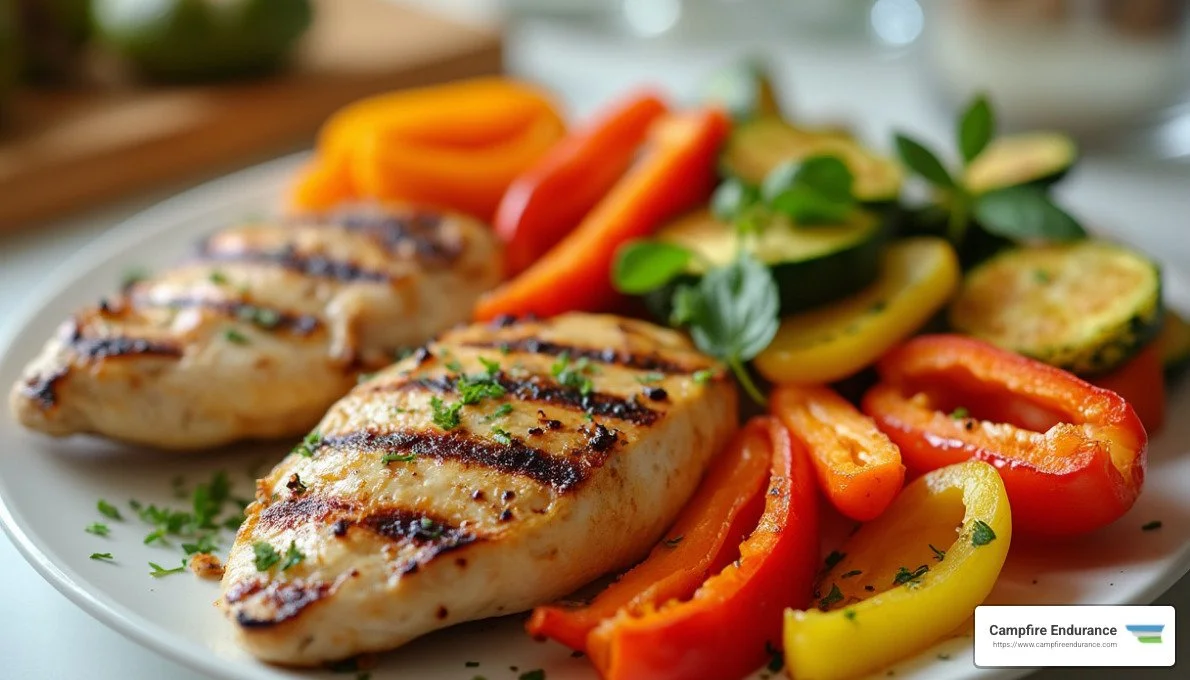Triathlete Meal Plan: Fueling Success from Sunrise to Sunset
Triathlete meal plan is a crucial component for individuals embarking on the rigorous journey of triathlon training. Whether you're gearing up for an Ironman, a half-Ironman, or tackling sprint and Olympic distances, what you eat can significantly influence your performance. A well-customized meal plan ensures you get the right mix of carbohydrates, proteins, and fats, supplying the energy and aiding recovery needed to excel across swimming, cycling, and running.
Carbohydrates: Your primary energy source; aim for 8 to 12 grams per kilogram of body weight per day.
Proteins: Essential for muscle repair; target 2 grams per kilogram of body weight, spread throughout the day.
Fats: Vital for balancing your macros; should constitute 20% to 35% of your daily caloric intake.
This initial breakdown provides a glimpse into how a triathlete meal plan not only fuels your body but also paves the way for holistic development. Nutrition is inextricably linked with the personalized guidance offered by our expert coaches at Campfire Endurance to elevate your training regimen.
As a team of seasoned triathlon coaches, we bring years of experience in crafting individualized meal plans. Having coached numerous triathletes, we understand how essential custom nutrition is to achieving peak performance. Let's dive deeper into creating a meal plan that fits your unique needs and supports your triathlon journey.
The Importance of a Balanced Triathlete Meal Plan
A balanced triathlete meal plan is essential for optimizing performance and health. At Campfire Endurance, we emphasize the importance of understanding macronutrients—carbohydrates, proteins, and fats—and their role in maintaining energy levels and supporting overall health.
Macronutrients: The Building Blocks of Performance
Carbohydrates are crucial for a triathlete's diet, providing the quick energy needed for intense training sessions. We recommend aiming for 8 to 12 grams per kilogram of body weight daily to ensure your muscles have enough glycogen to power through long swims, bike rides, and runs.
Proteins are vital for muscle repair and growth. Consuming about 2 grams per kilogram of body weight, distributed evenly throughout the day, aids recovery and supports muscle development.
Fats are important for sustaining energy levels over longer periods. They should make up 20% to 35% of your daily caloric intake, providing essential fatty acids and supporting nerve function.
Energy Levels: Keeping the Tank Full
Maintaining consistent energy levels is key for endurance athletes. As training intensifies, your body demands more fuel. An effective meal plan accounts for this by adjusting macronutrient intake to match the calorie cost of your workouts.
Imagine this: You're on a long bike ride, and suddenly, you feel your energy plummet. This "bonk" can be avoided with proper pre- and post-workout nutrition. Eating simple carbohydrates before a session and refueling with a mix of carbs and protein afterwards can help you avoid energy crashes.
Whole Foods: The Foundation of Health
Whole foods should be the cornerstone of any triathlete meal plan. They're nutrient-dense and provide the vitamins and minerals needed for optimal performance. Think of them as high-octane fuel for your body.
Fruits and Vegetables: Rich in antioxidants, they help reduce inflammation and speed up recovery.
Whole Grains: Sources like quinoa and brown rice provide sustained energy and fiber.
Lean Proteins: Chicken, fish, and plant-based options like beans support muscle repair without excess fat.
By focusing on whole foods, you ensure your body receives the nutrients it needs to perform at its best.
A well-balanced meal plan is not a one-size-fits-all solution. At Campfire Endurance, we understand that each athlete's needs are unique. Our personalized approach ensures that your meal plan evolves with your training, keeping you fueled and ready to tackle the next challenge. With the right mix of macronutrients, stable energy levels, and a foundation of whole foods, you'll be set to excel in your triathlon journey.
Next, we'll explore how to break down your daily meals to maximize your training efforts.
Daily Meal Breakdown for Triathletes
Fueling a triathlete's body is all about timing and balance. Each meal serves a specific purpose, from kickstarting your day to helping you recover and prepare for tomorrow’s training. Let's explore how to structure your daily meals for maximum performance, with insights from the team at Campfire Endurance.
Breakfast: Fueling Your Morning
Starting your day with the right fuel sets the tone for your training. Breakfast should be a blend of complex carbohydrates and proteins to replenish glycogen stores and kickstart muscle recovery.
Quinoa Cereal: Cooked with almond milk, a touch of agave, and vanilla, quinoa cereal is a powerhouse breakfast. It's packed with protein and fiber, keeping you full and energized.
Greek Yogurt: Pair your quinoa with Greek yogurt. It's rich in protein and probiotics, aiding digestion and muscle repair. Top it with fruits like pomegranate seeds for an antioxidant boost.
Lunch: Midday Energy Boost
Lunch is your opportunity to refuel after morning workouts and prepare for afternoon sessions. Focus on incorporating lean proteins and complex carbohydrates.
Turkey Burger: A turkey burger is a lean protein option that pairs well with whole-grain mustard and a variety of veggies. It's a satisfying choice that supports muscle recovery.
Salmon Bowl: Combine salmon with brown rice and roasted vegetables. This dish provides omega-3 fatty acids and complex carbs, crucial for heart health and sustained energy.
Dinner: Recovery and Replenishment
Dinner is all about recovery. This meal should help repair muscles and replenish energy stores.
Herb Grilled Chicken: Marinated with herbs and olive oil, this dish is high in protein and healthy fats. It's perfect for rebuilding muscle tissue.
Fish Pocket: Baked salmon with lemon and herbs offers a delicious dose of omega-3s and protein. Pair it with roasted vegetables for a balanced meal.
Smart Snacks for Sustained Energy
Snacking is essential for keeping energy levels stable throughout the day. Choose snacks that combine protein, healthy fats, and carbohydrates.
Trail Mix: A mix of nuts and dried fruits provides a quick energy boost with healthy fats and natural sugars.
Chia Pudding: Made with almond milk and topped with fresh berries, chia pudding is rich in omega-3s and fiber.
Smoked Salmon: High in protein and healthy fats, smoked salmon is a savory snack that supports muscle repair.
By structuring your meals and snacks strategically, you ensure your body gets the nutrients it needs when it needs them. This approach helps maintain energy levels, supports recovery, and prepares you for the next day’s challenges. The team at Campfire Endurance is here to guide you through personalized nutrition coaching to optimize your performance.
Next, we’ll explore how to customize your triathlete meal plan to suit your body type and dietary preferences.
Customizing Your Triathlete Meal Plan
Every triathlete is unique, and so should be their meal plan. At Campfire Endurance, we understand the importance of tailoring nutrition to fit individual needs, whether you're a vegetarian or adjusting your diet to match your training intensity.
Adapting for Vegetarian Diets
For vegetarian triathletes, incorporating plant-based proteins is crucial. Foods like beans, lentils, tofu, and quinoa can provide the protein your muscles need. Don’t forget about nutrient-dense foods such as leafy greens, nuts, and seeds, which are packed with essential vitamins and minerals.
Lentil Stew: Rich in protein and fiber, lentils are a hearty addition to any meal. Pair them with brown rice for a complete protein source.
Tofu Stir-Fry: Toss tofu with a medley of colorful vegetables for a meal that's vibrant and nutritious.
Vegetarian athletes need to be mindful of their iron and vitamin B12 intake. Consider fortified cereals and plant-based supplements to cover these needs.
Adjusting for Training Intensity
As your training ramps up, so does your calorie and macronutrient needs. Understanding the calorie cost of your workouts helps you adjust your portions accordingly.
Calorie Tracking: Use apps or journals to monitor your intake and ensure you're meeting your energy needs.
Macronutrient Demands: Focus on the right balance of carbohydrates, proteins, and fats. Carbs should make up the majority of your intake to fuel those long sessions.
Portion control is also vital. If you’re increasing your mileage or intensity, you might need larger portions, especially of carbs and proteins. On lighter days, scale back to avoid unnecessary weight gain.
Your meal plan should evolve with your training schedule. By listening to your body and making adjustments, you can ensure you're always fueled for performance.
Next, we’ll address some common questions about triathlete meal plans to help you optimize your nutrition strategy.
Frequently Asked Questions about Triathlete Meal Plans
What do I eat in a day as a triathlete?
A triathlete meal plan should cover all the bases: energy for workouts, recovery, and overall health. Start with a light breakfast like quinoa cereal or Greek yogurt to kick off the day. These options are rich in protein and carbs, essential for morning energy.
After swimming or other workouts, a post-swim refuel is crucial. Aim for a mix of protein and carbohydrates. A simple option is a turkey sandwich with a side of fruit. This combination helps replenish glycogen stores and supports muscle repair.
Throughout the day, focus on meals that include lean proteins, complex carbohydrates, and healthy fats. For lunch, consider a salmon bowl with brown rice and veggies. Dinner could be herb-grilled chicken with a side of roasted vegetables.
How much protein should I eat as a triathlete?
Protein is vital for muscle repair and recovery. Triathletes should aim for 1.6–2.2 grams of protein per kilogram of body weight daily. Spread your protein intake evenly throughout the day to maximize absorption and muscle repair.
You can easily meet your protein needs with meals like a turkey burger for lunch or a tofu stir-fry for dinner. Snacks like Greek yogurt or cottage cheese are also excellent protein sources.
Why are triathletes so lean?
Triathletes often have lower body fat percentages due to the high energy demands of their sport. The combination of swimming, cycling, and running helps build slow-twitch muscle fibers, which are more efficient at burning fat for fuel.
The high volume of training also promotes efficiency in energy use, leading to a leaner physique. Maintaining a balanced diet with the right mix of macronutrients supports this lean body composition, allowing triathletes to perform at their best.
These meal plan strategies and nutritional insights can help you stay energized and lean as you train and compete. At Campfire Endurance, we support your journey with personalized coaching and community engagement, ensuring you have the guidance you need to excel.
Conclusion
At Campfire Endurance, we believe that success in triathlon is not just about crossing the finish line; it's about the journey and the community you build along the way. Our approach focuses on fostering long-term relationships with athletes. We understand that each journey is unique, and we tailor our coaching to meet individual needs through our personalized training plans and nutrition coaching.
Community engagement is at the heart of what we do. We offer a supportive environment where athletes can connect, share experiences, and grow together. Whether you're a beginner or a seasoned competitor, being part of a community can make a significant difference in your training and motivation. Our athletes thrive not only because of the personalized guidance they receive but also because they are part of a vibrant and encouraging community.
Our commitment to holistic development means we don't just focus on physical training. Nutrition, mental toughness, and recovery are equally important. We provide comprehensive support to ensure that you have all the tools needed for success. From personalized meal plans to strategy sessions, our goal is to help you achieve your personal best while enjoying the process.
Join us at Campfire Endurance and become part of a community that values growth, support, and excellence. Together, we can achieve your triathlon goals and create lasting memories. For more information on how we can support your journey, visit our Triathlon Nutrition page.
By embracing a comprehensive training approach and engaging with a supportive community, you'll find that the journey is just as rewarding as the destination.




